WELL-BALANCED THEATRE WITH INDELICATE REALITIES
The exhilarating production of A Delicate Balance, directed by Tom Ross, epitomizes what Barbara Oliver had in mind for the Aurora Theatre Company when it opened two decades ago in Berkeley: she believed the text of the play to be the true star. Having premiered on Broadway in 1966 with Hume Cronyn and Jessica Tandy, this admired but seldom performed Edward Albee Pulitzer Prize-winning drama inspires us first and foremost with its wondrous exploration of language: Albee is a master at sophisticated repartee that teems with wit, even as his characters toss barbed implications at each other like darts. His plot compels us with unconventional storytelling, multi-dimensional characters, and keen perception into human nature. In the hands of an estimable company that truly makes it look effortless, we are reminded why people can become addicted to theatre, for long after the final curtain, we are left with food for thought, which we may find hard to swallow but can’t avoid doing so.
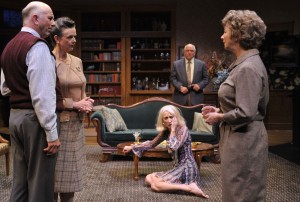 Longtime spouses Tobias and Agnes (played by real-life husband and wife Ken Grantham and Kimberly King) pair razor wit with emotional brutality in their gracious 1960s suburban home. When Agnes, played with seamless aplomb and erudition by King, contemplates going mad, she sets an absurdist tone that underscores the importance of her urbane image. While she threatens insanity, Tobias, played with deliciously exasperating detachment by Grantham, plumbs the liquor cabinet. Immediately, Albee’s intentions are fulfilled: he masterfully foreshadows disturbing things to come with themes of regret, unfulfillment, and aging.
Longtime spouses Tobias and Agnes (played by real-life husband and wife Ken Grantham and Kimberly King) pair razor wit with emotional brutality in their gracious 1960s suburban home. When Agnes, played with seamless aplomb and erudition by King, contemplates going mad, she sets an absurdist tone that underscores the importance of her urbane image. While she threatens insanity, Tobias, played with deliciously exasperating detachment by Grantham, plumbs the liquor cabinet. Immediately, Albee’s intentions are fulfilled: he masterfully foreshadows disturbing things to come with themes of regret, unfulfillment, and aging.
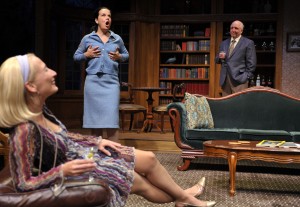 Living with them is Agnes’ alcoholic sister Claire (played with unrestrained physicality and roughshod humor by Jamie Jones), whose presence threatens the carefully preserved urbanity, not unlike a hilariously lopsided elephant in the living room. From this triad emerges a many-layered, embarrassingly accurate portrait of urban and urbane society. Yet this fragile and smooth patina (which overlays unspeakable and carefully restrained emotions) needs only a dose of the surreal – and quite a few swills of liquor – to crack wide open. That comes when Agnes and Tobias’ grown daughter, Julia (played with raw energy by Carrie Paff), comes running home after a fourth failed marriage; she’s a coltish bundle of nerves with the deep-seated needs of an ignored child. Adding a final layer of stinging absurdity, we have the arrival of longtime friends and neighbors Harry and Edna (played with 60s stylish suavity by Charles Dean and Anne Darragh) who are fleeing from an unnamed but overpowering fear at home.
Living with them is Agnes’ alcoholic sister Claire (played with unrestrained physicality and roughshod humor by Jamie Jones), whose presence threatens the carefully preserved urbanity, not unlike a hilariously lopsided elephant in the living room. From this triad emerges a many-layered, embarrassingly accurate portrait of urban and urbane society. Yet this fragile and smooth patina (which overlays unspeakable and carefully restrained emotions) needs only a dose of the surreal – and quite a few swills of liquor – to crack wide open. That comes when Agnes and Tobias’ grown daughter, Julia (played with raw energy by Carrie Paff), comes running home after a fourth failed marriage; she’s a coltish bundle of nerves with the deep-seated needs of an ignored child. Adding a final layer of stinging absurdity, we have the arrival of longtime friends and neighbors Harry and Edna (played with 60s stylish suavity by Charles Dean and Anne Darragh) who are fleeing from an unnamed but overpowering fear at home.
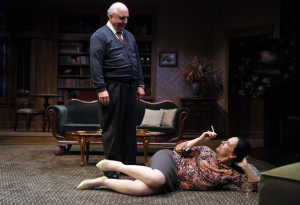 Everyone is clutching at straws; with searing need and desperation, they are running from something they cannot name for something that cannot assist them, except Julia, who actually brandishes a gun in her blind drive to regain the childhood bedroom from which she is displaced by Harry and Edna. Otherwise, emotions are siphoned off through Albee’s trademark ingredients: vicious sparring, the pouring of another cocktail, or cool restraint, such as when Tobias, with unnerving calm and unnatural precision, relates disposing of a pet cat that inexplicably stopping liking him.
Everyone is clutching at straws; with searing need and desperation, they are running from something they cannot name for something that cannot assist them, except Julia, who actually brandishes a gun in her blind drive to regain the childhood bedroom from which she is displaced by Harry and Edna. Otherwise, emotions are siphoned off through Albee’s trademark ingredients: vicious sparring, the pouring of another cocktail, or cool restraint, such as when Tobias, with unnerving calm and unnatural precision, relates disposing of a pet cat that inexplicably stopping liking him.
The thrust set by Richard Olmsted brings us up close into the living room and dysfunctional dynamic of the family; the room appears deceptively accommodating with plush leather chairs, well-arranged leather-bound books, and sparkling goblets. 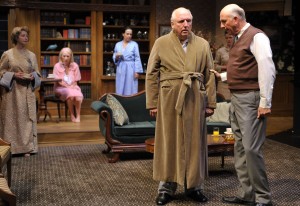 It is the well-stocked liquor cabinet, however, which dominates the view – a dead giveaway to the brittle and sodden facade of these urbanites.
It is the well-stocked liquor cabinet, however, which dominates the view – a dead giveaway to the brittle and sodden facade of these urbanites.
The actors move comfortably in the relatively cramped space and admirably rise to the task of making Albee’s surreal language seem as natural as everyday conversations, faltering only slightly in rhythm: the rapid delivery is challenging to distinguish at a few junctures. Silences, on the other hand, are handled masterfully, achieving the potency and strong effect that the playwright intended.
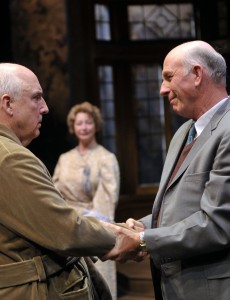 When Agnes states, “You wait, and time happens,” the viewer is left with a clear sense of the ever-present nearness of futility. This is why, in the tradition of bold theatre, A Delicate Balance is unnerving but satisfying. The play calls for a reexamination of personal responsibilities and the boundaries of our relationships. We leave the theatre refreshed with inspiration, even as we regard the delicate balance of our own lives.
When Agnes states, “You wait, and time happens,” the viewer is left with a clear sense of the ever-present nearness of futility. This is why, in the tradition of bold theatre, A Delicate Balance is unnerving but satisfying. The play calls for a reexamination of personal responsibilities and the boundaries of our relationships. We leave the theatre refreshed with inspiration, even as we regard the delicate balance of our own lives.
strevenon @ stageandcinema.com
photos by David Allen
A Delicate Balance
extended to Oct. 23
for tickets, visit http://auroratheatre.org
